Bad Homburg
Bad Homburg vor der Höhe, commonly referred to as Bad Homburg, is a spa town just outside Frankfurt in Hesse, Germany. With a sizeable castle and old town, the thermal springs and a casino frequented by kings, as well as its present highest per capita wealth in all of Germany, the city adopted an apt motto Champagnerluft und Tradition ("champagne air and tradition"). Despite its many attractions, the town is perhaps most known globally as the origin of the homburg hat.
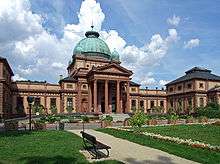
Understand
The town was only formally recognized as a spa in 1912, which allowed it to use the prefix "Bad", therefore for most of its history it was known as just Homburg. Historic research has proven for the town to have been in existence since the late 12th century. It has been a minor noble residence and market town for most of its history, until mineral springs were discovered in the 19th century and spa facilities along with a casino were built in the 1840s. It was actually the casino in Homburg that served as direct inspiration for the casino in Monte Carlo, which the Monegasque Prince ordered to be built "in the German style".
Homburg's popularity with the rich and famous drew the German Imperial family to declare the city its summer residence and invite numerous relatives, including Edward VII of the United Kingdom. Edward left lasting influence on men's fashion with his innovative dress choices, one of them being a simple and versatile felt hat, which he first acquired in Homburg. Thereafter it became known after the town's name.
Arguably, the main attraction in Bad Homburg is its Kurpark, a large park near the centre of the city within which are many mineral water fountains and monuments. The Kurpark roughly runs parallel to Louisenstraße, a long pedestrian mall lined with shops and a few nearby attractions such as the Landgrave Castle. One should consider walking through the Kurpark in one direction and along Louisenstraße in the other.
Get in
By train
Bad Homburg sees no long-distance traffic - getting there in general requires taking a local train or light rail from Frankfurt or its immediate surroundings. There are two stations in Bad Homburg on two separate railways:
- 🌍 Bad Homburg station. This is the main railway station in town, served by line S5 of the Rhein-Mein S-Bahn and the RB15 regional trains. It has a nice historic station building
- 🌍 Bad Homburg Gonzenheim station. This is the terminus of the line U2 of Frankfurt' U-Bahn (a deceptively named light rail system), located in the Gonzenheim district of Bad Homburg
The RMV website has schedules. For 2-5 people travelling together on a day trip from Frankfurt, the RMV group day ticket (Gruppentageskarte) is more economical and more convenient that using single trip tickets.
By car
The town is north west of the A5 - A661 interchange.
Get around
Bad Homburg has a well-developed network of 24 bus lines stopping at 130 stops. Pretty much all of them stop at the railway station (Bahnhof) and by the Kurhaus, with the exception of three-digit lines (245, 260, 261), which only serve the Bahnhof and not the Kurhaus. Lines 1, 4, 5, 11 and 260 also serve the Gonzenheim U-Bahn station.
Bad Homburg is part of the Rhein-Mein Verkehrsverbund transport association, which provides for unified fare structure and ticketing system. Getting about Bad Homburg only requires tickets for Stufe 1 (first stage - the cheapest).
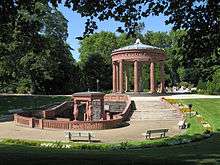
See
Kurpark
Kurpark (also called Bad Homburg Central Park) is a large park in the center of the city with mineral springs, the Kaiser-Wilhelm Bath, a small golf course, the Spielbank Casino, two Siamese pavilions, the Russian Chapel, Tennis courts, a big pond and a garden for blind people. There are occasional classical concerts near Wandel Hall at the eastern end of "Brunnenallee" (Avenue of Fountains).
- 🌍 Thai-Sala in the park (Thai-Sala im Park), Paul-Ehrlich-Weg, Kurpark. On May 22, 1914, the first Thai-Sala ("Siamese Temple") was inaugurated in the presence of Prince Mahidol of Siam.
- 🌍 Kaiser-Wilhelms-Bad, Brunnenallee, Kurpark. This palatial therapy house was built between 1887 and 1890.
- 🌍 Kaiserbrunnen ("Der Sprudel"), Brunnenallee, Kurpark. This fountain is in a pit before the Kaiser-Wilhelms-Bad. The acidulous sodium chloride water is fizzy and used for both bathing and drinking.
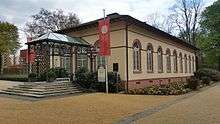
- 🌍 Spielbank Bad Homburg, Brunnenallee, Kurpark. The casino near the Kaiser-Wilhelms-Bad.
- 🌍 Thai-Sala at the spring (Thai-Sala an der Quelle), Am Weinbergsweg, Kurpark. In 2007, King Bhumibol and Queen Sirikit gifted a second Thai-Sala to Bad Homburg.
- 🌍 Stahlbrunnen ("steel spring"). This spring is rich in low-carbonic iron and its water is used to treat anemia.
- 🌍 Auguste-Viktoria-Brunnen, Brunnenallee, Kurpark. The fountain has a temple-style monument. Water from the fountain is used to treat gastroenterological disorders.
- 🌍 Louisenbrunnen ("sulfur spring"), Brunnenallee, Kurpark. Only die-hards drink from the "sulfur spring" as the water's taste and smell make it undrinkable for most people.
- 🌍 Landgrafenbrunnen, Brunnenallee, Kurpark. Fountain with a small art nouveau monument. The spring was discovered in 1899 and from 1903 onwards, its water was drunk as healing water to treat liver and gall bladder illnesses.
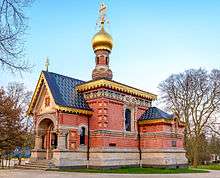
- 🌍 Russian Chapel (All Hallows' Church). The church was built in 1896 to serve Russian spa guests who wanted an Orthodox church.
- 🌍 Elisabethenbrunnen, eastern end of Brunnenallee, Kurpark. The statue of Hygeia, the Greek goddess of health, is seated inside a temple overlooking the fountain.
- 🌍 Small fountain, Augustaallee & Am Elisabethenbrunnen. The water from this small, utilitarian fountain near the Elisabethenbrunnen has a heavy bitter saline taste that people might find undrinkable.
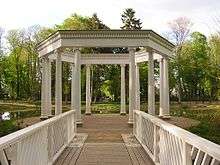
Other Parks
- 🌍 Schlosspark (Castle Park). A park with a big pond, situated west of the Landgrave Castle.
- 🌍 Kaiser-Wilhelm-Jubiläumspark. Inaugurated 1913 for the 25th anniversary of the accession to the throne of emperor Wilhelm II. Cycling is allowed here unlike in the other parks.
- 🌍 Kleiner Tannenwald, between Mariannenweg & Leopoldsweg. Park of the garden landscapes of the landgrave with quite a large pond.
- 🌍 Hirschgarten and Forstgarten located in the city forest west of Dornholzhausen; large game reserve with deer.
Castles
.jpg)
- 🌍 Landgrave Castle with White Tower (Schloss Bad Homburg vor der Höhe). The White Tower (Weißer Turm) is a remainder of an earlier medieval castle, and the town's landmark.
- 🌍 Roman Fort Saalburg (take a bus from Bad Homburg, or take the "Taunusbahn" to station "Saalburg" and walk 45 minutes along the Limes to reach the fort). Near World Heritage Site Limes (border wall between the Roman Empire and free Germanic lands).
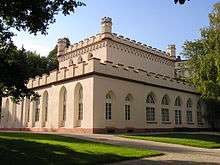
- Gotisches Haus (Hunting Lodge). Gothic House.
Other sites
- 🌍 Markplatz. This small square along Louisenstraße features an attractive half-timbered building.
- 🌍 AltStadt, Rind'sche Stift-Straße. At the corner of Rathausstraße and Rind'sche Stift-Straße, there is a small Altstadt with half-timbered buildings. Further along Rind'sche Stift-Straße, you will find a residential area with older style architecture again including half-timbered houses. This residential area extends under the Ritter-von-Marx-Brücke.
- 🌍 Ritter-von-Marx-Brücke. The western end of the bridge has 2 attractive towers called the Stumpfer Turm and the Rathausturm. The bridge also gives a rooftop view of the Altstadt below.
- 🌍 Hessenpark (near Anspach). Open-air museum.
- 🌍 Horex Museum, Horexstraße 6. W 10:00-14:00, Sa Su 12:00-18:00. A museum dedicated to the history of the motorcycle brand Horex, headquartered in the city. €2.50.
- 🌍 Museum im Gotischen Haus (Hat museum), Tannenwaldweg 102, ☎ +49 6172 37618, fax: +49 6172-937216, e-mail: museum@bad-homburg.de. Tu-Sa 14:00-17:00, Su and holidays 10:00-18:00. A museum covering history up to World War I and a hat museum. regular €2, reduced €1, under 14 free.
- 🌍 Central Garage Automuseum (car museum), Niederstedter Weg 5, ☎ +49 6172-5976057, fax: +49 6172-5976058, e-mail: info@central-garage.de. W-Su 10:00 - 16:30. Private car museum. free.
Do
- 🌍 Taunus Therme (Taunus Thermal Baths), ☎ +49 6172-4064-0, fax: +49 6172-42003. 61352 Bad Homburg v. d. Höhe. A Day Spa/pool that offers swimming, sauna, massages, dining, barrier-free (FKK) area, gift shop, therapeutic baths, and steam bath, much more in a romantic Japanese-style setting. €13-15 for basic 2 hour stay, €17-19 for four hours and €24-26 for day (adult). This pool is not geared for children, but they are welcome. Weekdays are typically quiet, but Friday and Saturday night is when the young couples come out.
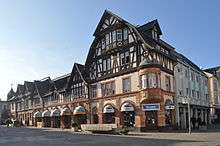
Buy
Bad Homburg has a shopping district along Louisenstraße, a pedestrian mall about 700 metres long.
Eat
- Kartoffelküche, Audenstraße 4, ☎ +49 6172 21500.
- Kaiserliche Küchenmeisterei, Schulberg 6, ☎ +49 6172 9445130.
- Klosterschänke, Herrngasse 1, ☎ +49 6172 25577.
- Hirschgarten, Elisabethenschneise, ☎ +49 6172 997688.
- Café Eiding (Reblaus), Schulberg 13, ☎ +49 6172 22855.
- Café Klatsch, Louisenstraße 107, ☎ +49 6172 682255.
- Trattoria Fantastico, Audenstraße 14, ☎ +49 6172 495217.
Drink
Sleep
- Steigenberger Hotel, Kaiser-Friedrich-Promenade 69, ☎ +49 6172 1810.
- Maritim im Kurhaus, Ludwigstr. 3, ☎ +49 6172 6600.
Go next
- Frankfurt, Germany's financial capital.